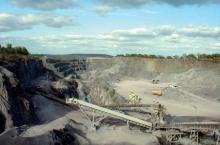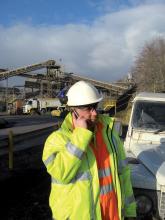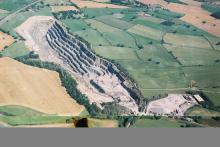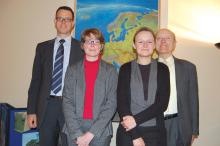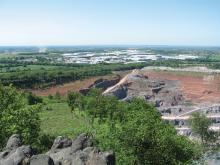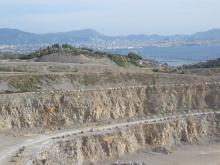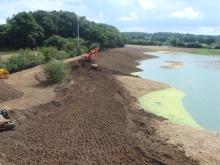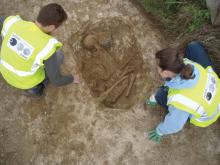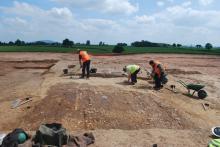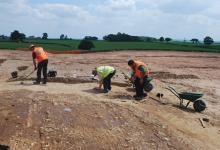After 44 years in the aggregates business most people would be looking forward to retirement but Tarmac's Bernie Higgins has taken on a new challenge instead
The growing importance placed on increasing biodiversity has led to development of new courses and degrees designed to create a skilled workforce to take on the challenge. But this new breed of ecologist does not necessarily have a good understanding of the needs and demands of the aggregates business.
That is where
Throughout his career, Bayston Hill quarry in Shropshire has been Higgins' base. The site extracts around 7,000tonnes of aggregates each week - and up to 950,000tonnes of material each year - of the local greywacke gritstone which is mostly used by the road construction market. The material is a high quality aggregate that features a sought-after high polished stone value and is transported all over the UK and is also exported abroad.
"I started my career with Tarmac as a delivery driver taking materials from the quarry to customers' sites," explained Higgins. "Later I moved to working in the quarry at Bayston Hill and operating the machines. I used to operate mainly loading shovels and started with a
As Higgins' career with Tarmac progressed he moved to working on the new coating plant at Bayston Hill - the site's second unit. "That was 25 to 30 years ago and the plant was very modern for its time," said Higgins. "I started as foreman and then got involved in the introduction of quality assurance on the unit." Until 15 years ago, Higgins' work and interest in the environment did not really cross but when the quarry planned an open day he got involved and organised an exhibition about badgers for visitors. It was then that Tarmac's estates department realised what an asset Higgins' interest in ecology could be to the company and he started to get involved in more than the operation of the asphalt plant.
"Over the last 15 years I have been combining two jobs - that of asphalt plant supervisor and ecological advisor," said Higgins. "Instead of working solely at the quarry, I started to visit other Tarmac sites to carry out ecological surveys.
"The work soon progressed to projects to improve the ecology, such as relocating wildlife to ensure the activity of the quarries caused minimal impact on the local wildlife. I worked on a number of projects involving relocating badgers and bats among other animals." As Higgins' retirement approached he had planned to give up work completely but Tarmac's estates department persuaded him to take on a part time role and concentrate on his ecological work. "I retired as asphalt plant supervisor on the Friday and then rejoined the company the following week as Tarmac's first biodiversity officer," he said.
Officially Higgins is working for Tarmac two days a week but is flexible about which days he works but his passion for the environment means he never really stops - he said he is always available at the end of a telephone. "I'd rather get a call when I'm not working and provide the right advice when it is needed," he said.
"I am responsible for recording all the wildlife, flora and fauna at Tarmac's quarries in Wales and Shropshire as part of the company's biodiversity action plan (BAP) programme. This involves recording everything from dormice to peregrine falcons, badgers to butterflies, barn owls to otters and every single shrub, tree, and flower present at every site.
"I am thoroughly enjoying my new role and concentrating just on the ecology. I am still based at Bayston Hill but now I am working directly for the estates department." As biodiversity officer, Higgins travels around Tarmac's quarries in Shropshire and Wales to carry out survey work to gain licenses for moving wildlife and carrying out checks ahead of overburden stripping.
Over the last two years he has been helping quarries in his region create biodiversity management plans and is now working on updating these and providing advice on future developments at the sites. "Developing the plans involves surveying the site, liaison with the local council, conservation societies and other interested parties," he said.
Higgins believes that he may be the only dedicated ecologist in the quarrying industry, with others relying on consultants, but that is something he hopes will change in the future.
According to Higgins, having these capabilities in house is much better for an aggregates business than using consultants. "Through a better understanding of the business it is easier to balance the needs of the quarry with that of ecology and in a better position to find the optimum solutions," he said.
"Having the skills in house allows for a quick response which does not compromise the ecology and has minimal impact on production because the person will have a good understanding of the sector and the relationships with both the site and other interested parties. In essence it is just more effective.
"Improvements in quarry management in recent years mean that there is now often more biodiversity in a quarry site than the surrounding countryside and agricultural land. Quarrying also has the potential to further improve biodiversity through carefully planned and managed restoration of exhausted sites, although it is something that the industry should have been doing for a lot longer but major progress has been made." Looking back over his four decade career at Tarmac, Higgins has said that conditions have changed considerably over that time. "Working conditions have improved significantly and safety considerations are now high priority," he explained. "In the same way there have been some big steps forward in biodiversity. Quarries used to just clear vegetation and habitats and start extraction. But today checks are carried out before even one tree is removed to ensure nature is not impacted." As far as Higgins' is concerned, a key part of his role is passing on his knowledge to the next generation. "I am trying to educate an individual in each unit to take on management of the biodiversity plan," he said. "This helps to take the pressure away from the quarry manager. We try to find people with an interest in the environment who are keen to learn." This sense of responsibility to pass on his knowledge goes beyond Tarmac's employees and Higgins also regularly gives talks to local schools and interest groups.
Higgins is clearly enjoying his new challenge and hopes that other biodiversity officers will take on the task. "The benefit for biodiversity from quarrying in the future is fantastic," he said. "There are lots of opportunities."

